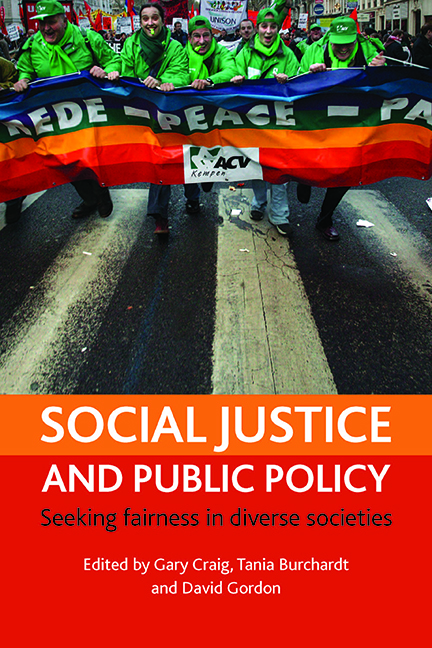Book contents
- Frontmatter
- Dedication
- Contents
- Acknowledgements
- Notes on contributors
- Introduction
- one Social justice and public policy: a view from political philosophy
- two Social justice and public policy: a social policy perspective
- three Multiculturalism, social justice and the welfare state
- four Structural injustice and the politics of difference
- five Recognition and voice: the challenge for social justice
- six Globalisation, social justice and the politics of aid
- seven Social justice and the family
- eight Children, policy and social justice
- nine Social justice in the UK: one route or four?
- ten Monitoring inequality: putting the capability approach to work
- eleven The limits of compromise? Social justice, ‘race’ and multiculturalism
- twelve Understanding environmental justice: making the connection between sustainable development and social justice
five - Recognition and voice: the challenge for social justice
Published online by Cambridge University Press: 19 January 2022
- Frontmatter
- Dedication
- Contents
- Acknowledgements
- Notes on contributors
- Introduction
- one Social justice and public policy: a view from political philosophy
- two Social justice and public policy: a social policy perspective
- three Multiculturalism, social justice and the welfare state
- four Structural injustice and the politics of difference
- five Recognition and voice: the challenge for social justice
- six Globalisation, social justice and the politics of aid
- seven Social justice and the family
- eight Children, policy and social justice
- nine Social justice in the UK: one route or four?
- ten Monitoring inequality: putting the capability approach to work
- eleven The limits of compromise? Social justice, ‘race’ and multiculturalism
- twelve Understanding environmental justice: making the connection between sustainable development and social justice
Summary
Introduction
This chapter addresses both the more theoretical and the more policyoriented themes of this volume. It begins with an overview of how some of the theoretical literature on social justice has addressed the relationship between distributional and relational justice (couched in the language of recognition and voice). Is social justice about distribution or is it about relations of respect, recognition and voice – or a combination of the two?
The chapter then turns to its central concern, namely the recognition paradigm of social justice. The first issue it addresses is the association of this paradigm with social movements and identity politics. According to Barbara Hobson (2003, p 2), ‘recognition has been grounded in normative political theories of justice, citizenship, and democracy in which inclusion, rights, and membership are the cornerstones’. ‘Identity is at the core of the recognition paradigm’, Hobson (2003, p 4) states, and recognition struggles ‘make claims resulting from devalued statuses and misrecognized identities’. However, as will be argued, that does not mean that recognition struggles necessarily constitute identity politics (Lister, 2005).
Indeed, the chapter will contend that the recognition paradigm of social justice helps us to make sense of the contemporary politics of poverty, more typically associated with the distributive paradigm and certainly not a form of identity politics. Despite having worked within the distributive paradigm as both a campaigner and an academic for most of my adult life, through my readings of political, social and feminist theory and also through listening to and reading what people in poverty say about what poverty means to them, I have come to believe that a poverty politics of social justice must integrate distributive and recognition perspectives. This can be identified as ‘a politics of redistribution and of recognition & respect’, in acknowledgement of how people with experience of poverty themselves use the language of respect (Lister, 2004).
From an analytical perspective, ‘recognition and redistribution become specific lenses for viewing the same struggles, rather than discrete categories’ (Hobson, 2003, p 2). Anne Phillips (2003) reinforces this point. She observes that ‘struggles for recognition are and have been very much struggles for political voice’ (2003, p 265) and that understood in this way the struggles are less obviously about a particular category of injustice.
- Type
- Chapter
- Information
- Social Justice and Public PolicySeeking Fairness in Diverse Societies, pp. 105 - 122Publisher: Bristol University PressPrint publication year: 2008
- 1
- Cited by



